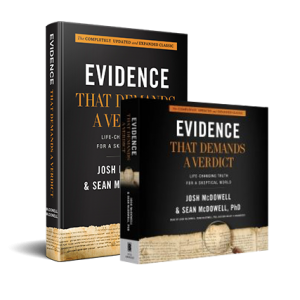
Can Science and the Genesis Creation Story Co-Exist?
Genesis 1 — the creation story — inspires some of the most heated, sensitive, and yet important controversies within the Church today. How we personally view Genesis 1 does impact how we, individually, view the rest of Scripture, science, and the nature of the gospel itself.
Many young Christians, in fact, indicate that the supposed conflict between Christianity and science is one of the main reasons they have chosen to leave the church. That’s terrible news, right?
While the Church finds itself unable to reach a universal consensus on how to interpret Genesis 1, Christians must keep in mind that God reveals Himself in both Scripture and nature. Where we find apparent contradictions between the two, we must go back and revaluate our science and/or our interpretation of Scripture.
Writes R.C. Sproul, “There are two spheres of revelation; the Bible (special revelation) and nature (general revelation). In the latter, God manifests Himself through the created order. What God reveals in nature can never contradict what He reveals in Scripture, and what He reveals in Scripture can never contradict what he reveals in nature. He is the author of both forms of revelation, and God does not contradict himself.”
In this post, let’s look at various church interpretations of the Genesis 1 creation story, which highlight only topically the ongoing, raging debate over whether the inerrancy of the Bible demands a literal adherence to the text. Or can Christians embrace both God and modern science, without judgement from those who disagree?
Early Church Interpretations
Genesis was written in Hebrew, and a responsible interpretation requires a good understanding of the Hebrew text. The use of commentaries that shed light on the nuances of the Hebrew text — for example the meaning of words, genre, verb tenses, literary devices, and the culture of the day — can be of considerable help in understanding the original meaning of a passage.
Let’s summarize three main interpretations of Genesis 1 that emerged from early church fathers, and then some of the modern interpretations. Obviously, they can’t all be correct … perhaps not even one of them is correct:
Epoch Day View
In writing about the sixth day of creation, Irenaeus, an early church father, was among others who suggested that this day could have been a thousand-year epoch. Irenaeus concluded that, based on the scriptural teaching that for God one day is as a thousand years (Psalm 90:4, 2 Peter 3:8) and that Adam lived for 930 years before dying (Genesis 5:5), the sixth day of creation could have lasted for a thousand years. Clearly, Irenaeus held the view that yom, the Hebrew word used for “day,” could be interpreted as an epoch or age.
Allegorical/Figurative Day View
Several early church fathers recognized a challenge in understanding the nature of the creation days: the sun, moon, and stars were not created until day four, so the first three days could not have been normal calendar days in terms of the earth’s movement in relation to these celestial bodies. Augustine of Hippo (AD 354-430), in his book The City of God, wrote: “As for these ‘days,’ it is difficult, perhaps impossible to think — let alone explain in words — what they mean.” In his commentary The Literal Meaning of Genesis, he argued that a creation day was not a typical calendar day, “certainly not such as the one we are familiar with here.” Concerning the duration of the creation week, Augustine believed that “God made all things together simultaneously,” and that the days are used to provide a logical — not chronological — sequence of explanation to us.
24-Hour View
Many church fathers held the twenty-four-hour view of the creation days — among them Lactantius (AD 250-325), Victorinus (died AD 304), Ephrem the Syrian (AD 306-373), Basil of Caesarea (AD 329-379), and Ambrose of Milan (AD 338-397). These literalists asserted that the six days of creation were each 24 hours long.
Modern Interpretations of Genesis 1
Toward the end of the eighteenth century, two developments provided an impetus for more thinking and debate over the interpretation of Genesis 1: the new discipline of geology and archeological discoveries. Two groups of thought emerged: Concordism, which is the supposition that the biblical teaching in Genesis can and should be harmonized to the developing scientific theories, and Non-Concordism, which does not try to harmonize biblical text with science because it doesn’t believe the intent of the biblical writer was to address modern science.
Concordist interpretations are driven by what some believe are remarkable agreements between the biblical text and modern science. Astronomer Robert Jastrow, for instance, has said, “Astronomers now find they have painted themselves into a corner because they have proven, by their own methods, that the world began abruptly in an act of creation. … That there are what I or anyone would call supernatural forces at work is now, I think, a scientifically proven fact.”
Concordists hold to one of two views concerning the age of the earth. “Old Earth” interpretations accept the mainstream scientific dating of 4.5 billion years. “Young Earth” interpretations claim the earth is 6,000-10,000 years old. The Young Earth views, rather than harmonizing with mainstream science, believe that mainstream science has incorrectly concluded that the earth is ancient and that the scientific evidence needs to be reconsidered.
Non-Concordist interpretation is driven by the desire to understand how early ancient Near East readers would have understood the text, given that the worldview of the original audience differs greatly from modern worldviews. As much as we’d like to do so, writes John Lennox in his book, Seven Days That Divide the World: The Beginning According to Genesis and Science, “we cannot simply read it as if it were a Western document written to address contemporary Western concerns.”
Let’s now look at concordist interpretations, starting with those who believe the earth to be quite old and finishing with those who believe it to be quite young:
Old-Earth Creationism (OEC)
OEC accepts standard scientific dating for the age of the universe. This does not mean, however, that OEC necessarily embraces some form of evolution. In other words, evolution requires an old earth, but just because the earth is old does not mean evolution is true.
Those who hold to the Gap View believe that an undefined period of rebellion followed God’s creation of a perfect universe and earth, during which Satan was cast to earth. This view posits that the “gap” between Genesis 1:1 and Genesis 1:2 could have lasted millions of years. This view, however, has grown out of favor with recent scholars.
Those who hold to the Day-Age View maintain that the days of creation are long but finite periods of time: “ages.” They note that the Hebrew word for day, yom, has different meanings depending on the context in which it is used. Specifically, Day-Age proponents argue that the amount of activity in the sixth day implies the passage of more time than a calendar day, that Adam’s response to Eve in Genesis 2:23 (“this at last is….) suggests a long period had elapsed between the time Adam began his work of naming animals and the creation of Eve, and that the absence of an end to the seventh day implies that we are still in this day.
Those who hold to the Intermittent Day View believe that the creation events described in Genesis occurred over a long period of time, subdivided into six parts, which is introduced by a literal day. This theory provides harmony between the interpretation of yom as a literal calendar day and today’s mainstream scientific view that the events described in Genesis 1 must have occurred over long periods of time.
Those who hold to the Days of Divine Fiat View argue that Genesis doesn’t describe six days of God working, but the days on which God issued His creative commands or “fiats.” Proponents of this theory believe the actual time taken for the outworking of creation can be estimated by modern scientific methods. The perspective here is God’s perspective from heaven: God stepped out on nothing in the inky blackness of eternity and simply spoke creation into existence.
Young-Earth Creationism (YEC)
YEC generally holds that the whole universe is as young as the earth. YEC questions the reliability and assumptions of many popular dating techniques used by the mainstream scientific community. YEC counters that there is much evidence that point to a young earth, and that although mainstream science has been biased toward an ancient earth, it is through the Biblical view of six days of creation that all scientific evidence must be viewed.
Some proponents of YEC believe in the validity of the 24-Hour View, which claims that God created the world in six, literal 24-hour days, as Genesis records. Arguments made for this theory include that the text wording “Evening came and then morning” seems to indicate a literal day, that Sabbath rest seems to imply six literal days of work during the creation week, and that although the sun was created on day four, there was life on day three (Genesis 1:11-13). As life can’t exist for long periods without sunlight, they assert, the days were not long ages.
The Mature Creation View also holds that creation took place over six 24-hour days. But here, God created the universe and all that is in it with the appearance of age.
Let’s look at three Non-concordist interpretations:
Those who hold to the Framework View interpret the Genesis account of creation to be a figurative framework that describes real history. This view maintains there are two “registers” of creation: the upper (invisible) and the lower (visible). The complete seven-day framework, they assert, is a metaphorical appropriation of lower-register language denoting an upper-register temporal reality.
“Why did Moses employ the anthropomorphic picture of God going about His creative labors in six days and resting on the seventh? He did so in order to communicate a theological message,” writes Dr. Lee Irons in his article on the subject. “The theological point of this literary structure is that the creation was made by God to be subordinate to man and through man’s obedient work as God’s regent exercising dominion over creation to enter God’s own rest. God’s purpose for creation was, through Adam’s obedience, to be ultimately transformed and glorified in order to be the theater of God’s glory and the eternal dwelling place of glorified humanity.”
Those who hold to the Analogical Days View believe that not everything in the Genesis account needs to be taken as historically sequential. It is possible, they assert, that parts of some days overlap and that events on a particular day may be grouped for logical rather than chronological reasons. Says John C. Collins who developed this interpretation, “Genesis 1:1–2:3 is not a scientific account. … I would claim that it lays the foundation for all good science and philosophy, by telling us that the world came from a good and wise Creator.”
Those who hold to the Functional Cosmic Temple View argue that the use of the Hebrew verb bârâʼ (בָּרָא) in describing God’s creative activity refers to the creation of function rather than material. The key functions necessary for life were created during the first three days: the basis for time on day one (periods of light); the basis for weather on day two (water cycle); and the basis for food on day three (land and vegetation). The seventh day, the day of rest, represents God taking up His dwelling in the functioning cosmic temple. In this interpretation all the functions meet the needs of humanity, with God’s presence serving as the defining element of existence.
Science and the Bible at Odds?
Christianity and science need not be at war with each other.
Many Christians believe that a literal, traditional view of the Genesis 1 story is the only alternative for “true” Christians. They simply can’t fathom how ANY Bible-believing Christian would deviate from the view that God created the universe in six consecutive 24-hour days, or that the earth is much older than about 6000 years.
Other Christians view this perspective to be narrow, if not silly. Could God have created the earth in six days? Of course, without breaking a sweat. But the length of time it took Him to do so isn’t the point of Genesis, they believe, so it doesn’t need to taken literally.
Let’s be clear on how we should view the word “literally.” Professor Norman Geisler does a great job in a reply he gave in an interview posted on the Billy Graham website:
“Everything in the Bible is literally true, but not everything is true literally. Jesus said, ‘I am the vine, I am the door.’ No one looks for a doorknob or hinges, or leaves coming out of His ear. The Bible has parables, and it has figures of speech. We adopt the literal method of interpreting the Bible as opposed to the allegorical method, where you spiritualize the meaning of the Bible. For those proponents, the resurrection didn’t happen literally, it was just a spiritual resurrection in the hearts of the disciples.”
As Christians it’s critical that we have a proper understanding of God’s Word — even as we disagree on particulars.
“Christians of one perspective,” writes BlueLetterBible.com, “are becoming skeptical of the genuineness of the salvation of those who hold to another interpretation.” Our view: the body of Christ needs to recognize that well-meaning Christians can hold differing interpretations of Genesis 1 and still remain within orthodoxy.
Surely Christians can agree on this: the book of Genesis shows us the creativity and power of our Creator. It shows us that God is in the details; that our universe is not the result of a haphazard accident, but part of a meticulous plan — however long He took to make it. And His creation matters to Him. Thus, you and I matter to Him. Some day God will fill us in on all the details. I don’t know about you, but I can hardly wait.

This blog post highlights Josh and Sean McDowell’s recently revised apologetics classic, Evidence That Demands a Verdict. We are certain this fully updated and expanded resource will be an effective evangelism tool for you, and strengthen your faith by answering the toughest questions tossed to you by skeptics. Know what you know, because it’s true. But share this truth with LOVE!
If you’d like to start from the first blog post in this series, click here: Apologetics: Apologizing for Believing in God?.



